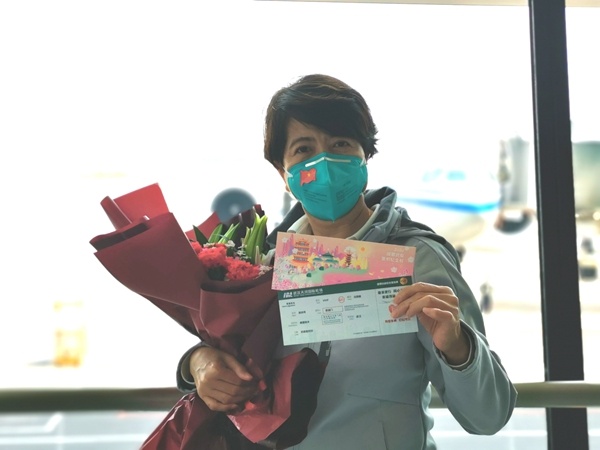
Wang holds a special souvenir air ticket commemorating her fight against COVID-19 at Wuhan Tianhe International Airport before her flight back to Beijing. (Photo: China Daily)
With a 30-year career under her belt as an accomplished head nurse and a veteran of the 2003 SARS outbreak, Wang Yuying once again found herself donning protective gear for a mission to fight COVID-19 in Wuhan, Li Yingxue reports.
When Wang Yuying arrived in Wuhan, Hubei province, on the night of Feb 1, it was only seven hours after she received the call that she had been assigned to help at the epicenter of the novel coronavirus.
She said yes to the call immediately and took just minutes to pack.
"I packed a small suitcase with three changes of clothes, and enough drugs to last me a month and a half for my hypertension, as well as sleeping pills and migraine medication," the 59-year-old head nurse recalls.
She didn't know how long she would be deployed to the virus-stricken city, so she estimated the amount based on her experience of fighting SARS 17 years ago-she worked for one month solidly before being relieved.
Wang was one of the 135 medical workers dispatched in three groups by Peking University First Hospital to help treat seriously ill COVID-19 patients at Tongji Hospital's Zhongfa Xincheng branch in Wuhan during the height of the outbreak.
The day after arriving, Wang started to take care of the patients. Four days later, she was assigned as the head nurse of the medical team from Peking University First Hospital, and their team was asked to start taking patients independently within two days.
"We have 102 nurses and 50 beds, and not only did we need to get the facilities in the special wards ready, which were transformed from regular wards, but we also had to train all medical workers on how to use the protective clothing," Wang says.
"The ventilators in our wards were all donated, so they were a mix of different brands and types, so we all needed to get familiar with using each one of them."
According to Wang, her team of nurses were all under 40 years of age with at least three years' experience, and they have all worked night shifts and rotated at the ICU before.
"The medical protective equipment was limited then, and the work was heavy and intensive, and many of the patients needed to be put on ventilators, so we required young but experienced nurses," Wang explains.


